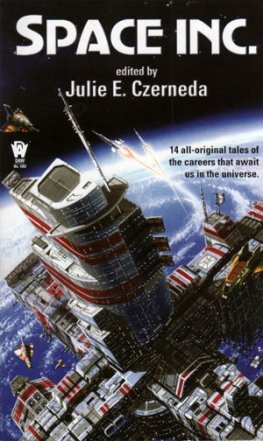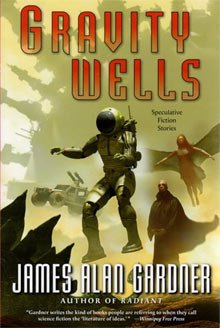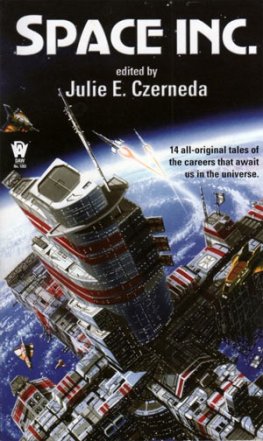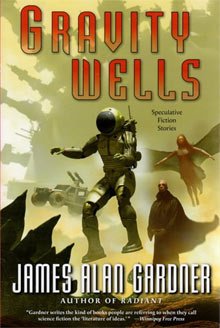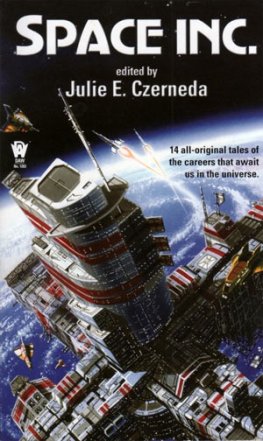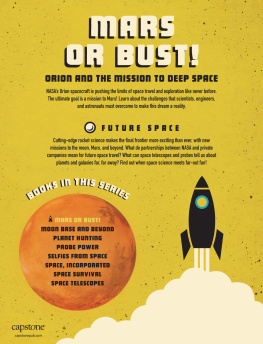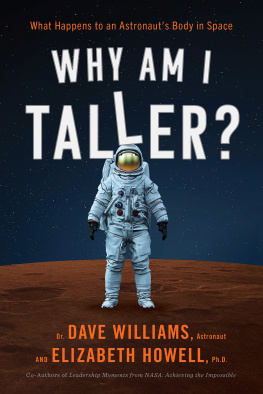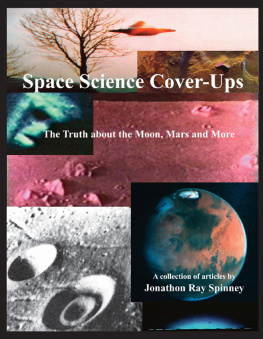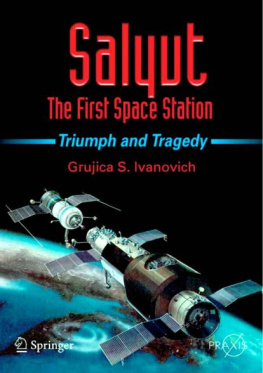Space Inc.
edited by Julie E. Czerneda
Introduction
by Julie E. Czerneda
Tinker, tailor, soldier, sailor a familiar rhyme to I many about work on Earth and just the beginning of a very long list of possible ways to earn a living here. But what happens when we leave this planet? What will happen to the jobs we know? And what jobs will be created because of the realities of space? I can guarantee it will be more than astronaut, tourist guide, and telescope technician, though Im sure those jobs will still exist.
Like you, Im curious about many things, but especially about the world around me. Not only the world itself, but people and what they do. Driving down a road, Ill wonder whats being made in the buildings I pass. Id prefer some clues to guessing. Would meaningful company signs be too much to ask?
When I use something in my home, every so often Ill pause and wonder at it. Who made it? How? Why? How long ago? I can look up technical information, but its infinitely more satisfying to talk to the people involved. I know, because Ive had the good fortune to interview well over a hundred individuals about their work as part of my job. Pattern makers and physicists, cartographers and carvers, dog trainers and designers. The more I learn, the more Im fascinated by how diverse the things we do for a living really are. We are, frankly, a very busy species.
And, like many of you, Im curious about space, too. I have every confidence well be living there and soon. So what about people and what will they do? Human enterprise is complex and interrelated. We depend on one another for so muchand how much more this interdependency will matter in space!
Will work itself change? Will we?
That was what I asked these talented authors: mink about our future and look up into space. Describe who you see and what they are doing. The regular folks. Real people trying to make a days living.
Because if we are to live in spacereally live, and not just be visitorsit will be because of people like these, and what they do.
The Eightfold Career Path; or Invisible Duties
by James Alan Gardner
HELP WANTEDRACONTEUR
Open-minded and gritty traveler, to recount his adventures through the universe, with particular attention to enlightenment and the varied roles taken on by members of the local population.
Must have own transportation, health insurance, and excellent speaking voice. Wide knowledge of Buddhist and other teachings an asset.
Apply in person for an audience at the Emperors Court.
After Marco Polo has described a dozen cities seen in his travels, the exalted emperor, Kublai Khan, talks with Polo long past dusk. The moon rises, shining brilliantly through the glass of Xanadus pleasure dome. Shooting stars whisk past overhead, and conversation turns toward the practices of those who live in the heavens.
Some years ago, the emperor reveals, the captain of my guard was a Shaolin monk: a follower of the Buddha and a man given to visions of the future. He told many tales of the times to comeespecially the work our descendants will do to earn their daily bread. Each of his stories also related to Buddhist principles such as the Eightfold Path which Shakyamuni Buddha prescribed as the road to enhghtenment.
Id be interested in hearing such tales, Polo says, if, great emperor, you were inclined to repeat them.
Im happy to do so, Kublai Khan replies. I think about the stories often, and reflect upon their lessons.
As Marco Polo listens in darkness, the emperor begins to speak
Right Understanding
At Uranus Tech, each physics grad student must spend a term contributing to the Particle Position Project This work counts as a T.A. credit and therefore earns a stipend of $12,800 for the semester.
The goal of the Particle Position Project is to map the precise position of every particle in the universe as of 4:15 PM Eastern Standard time, November 27,1952. The project is carried out via time-scanning, a technique that allows students to peer into the past, even down to the quantum level. Each participating student is assigned a cubic millimeter of the universe and asked to determine its contents at the precise reference instant of the survey. This requires trillions of repeat viewings and extremely careful measurements.
The work is considered good preparation for more demanding experiments. Students with insufficient patience for this chore are asked to consider if physics is really an apt career choice.
When the Particle Position Project is complete, the resulting data will be used as a baseline for various theoretical models. The information may even have practical applicationsafter all, there must be some commercial value to knowing where everything is.
Meanwhile, in an alternate universe, each physics grad student at Uranus Tech must spend a term contributing to the Particle Momentum Project
Right Intention
The VBing of Epsilon Eridani are so highly advanced, their science can literally do anything: FTL, time travel, creating and destroying universes, playing conkers with Dyson spheres on the end of cosmic strings the VBing can achieve anything imaginable.
The problem is they have poor imaginations. (Perhaps thats the reason for their technological prowess.) Thus, when the first Earthling scout ship reached their planet, they immediately hired the pilot to be their ideas man. Now, this pilots job is to think of things for the VBing to do.
So far, the VBing have ended hunger throughout the universe, given everyone immortality, taken it away again, reversed the spin direction of the Milky Way Galaxy, eradicated sixty-three warlike alien races, and given the pilot a succession of sexual partners with escalating degrees of voluptuousness and libido.
Long ago, the pilot realized he could suggest that the VBing increase their imaginations. The VBing could do thatthey can do anything. Then they could come up with ideas of their own.
But why would the pilot jeopardize his job security? He just hopes the VBing dont think of it themselves.
Right Speech
Research stations in Jupiters atmosphere must be adapted for ultra-high-pressure conditions. For example, to avoid nitrogen narcosis, station air supplies are mixtures of oxygen and helium rather than oxygen and nitrogen. This means that regular station residents speak with the squeaky cartoonlike voices that result when human larynxes vibrate in a helium environment.
Those who live in such stations say they quickly become accustomed to the phenomenon. Psychological tests prove otherwise. Extended exposure to high-pitched helium voices causes severe subconscious stress, leading to a variety of mental disordersfrom general anxiety and mood swings to clinical depression and outbursts of rage. The reason is simple: Homo sapiens evolved as social animals, and they have a deep-seated need to hear voices that are recognizably human.
To satisfy this need, each station has at least one man and one woman with their larynxes surgically altered to sound normal in helium. These people are not researchers: their job is simply to walk around the station, letting their voices be heard. Sometimes they tell stories or jokes; sometimes they share gossip theyve picked up from other people in the station; sometimes they sing, recite poetry, or just ramble on about nothing. The content of their words isnt as important as the soundthe soothing timbre of a human voice. Wherever these people go, they ease tension and make it possible for others to concentrate on their work.
Outsiders sometimes ask why all people on these stations dont have their voices altered. Unfortunately, a larynx that works normally in an oxygen-helium atmosphere doesnt work at all in conventional air. Therefore, researchers who want to go home again cant have the surgery and the people so treasured for their voices on Jupiter station are utterly mute on Earth.

